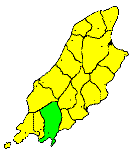



Parish dedicated to St Lua, Malew,
probably once the most important parish as it includes Castle Rushen
and the erstwhile Island capital Castletown
whose churches are covered
separately.
The parish also contains the remains of the once great Rushen
Abbey.
See Parish Index page for description, links to 19th century directories etc.
|
What all the old Manx churches were like before Victorian restoration; outside a white-washed rectangle in fields; inside box-pews and Georgian fittings. North transept 18th century.[JB]
Looking down church from West Gallery - organ and pulpit on southside, north transept opposite organ. |
|
|
Grid Reference SC268694 |
Probably the finest of the Parish Churches - being the Parish Church for Castletown, the one time capital, it contains a fine selection of memorials (mainly to the Goldie-Taubman's) and mostly 19th century stained glass.
Some earlier church furniture has survived including a 12th century crucifix (replica mounted on wall) and medieval lantern.
A selection from the early Parish Registers was given in Manx Note Book Vol 6 p72 et seq
|
|
Intended to provide a more convenient Chapel of Ease
together with a parish school for those from the outlying
mountainous districts. Hugh Cosnahan (of Kew)and Thomas
Fargher (of Shenvalley) appeared to be the instigators of
the foundation. Consecrated 1772 by Bishop
Mark Hildesley hence the dedication to St Mark though
Kneen states that there was an ancient church near the site
which was probably dedicated to St Mark as the fair was held
around May 12th (Old style). |
|
Grid Reference SC295740 |
W. Harrison Records of Saint Mark's
Chapel in the Parish of Malew... Manx Soc vol 28
1878
|
Built from local limestone in a plain early English style. Foundation stone laid June 1895 by Lady Ridgeway; consecrated 1896. Current proposal is to cease services at Kirk Malew and concentrate on St Mary's. |
|
|
Grid Reference SC279703 |
|
Built as a mission room, opened June 1898 and also
licenced for Baptisms. There is reference, in 1857 Slater's directory, - 'a building has lately been purchased by donations procured by the Rev, G. Harvey, Chaplain and Bursar of King William’s College, to be converted into a school house, and to be used on Sunday’s for divine service.' |
|
|
Grid Reference SC284677 |
|
Dedicated to St. Thomas |
|
|
Grid Reference SC277679 |
|
Norse-Celtic, probably early 12th Century prior to establishment of insular parishes. Roofless for at least 300 years, J.R. Bruce puts its good preservation to its situation on non-agricultural land and subsequent use as a burial ground by Roman Catholics during late 18th/early 19th Century. |
|
|
Grid Reference SC295673 |
First mentioned in Chronicle of Man when a battle took place in 1250 at insula Sancti Michaelis, Blundell in c.1648 mentions 'a handsome church with a spire steeple' - the spire steeple being an exaggerated description of the bell-turret then a feature unusual in Manx Churches. Daniel King's vignette view of 1651 shows a roofless building with high gables with the western gable containing a bell turret. Some repairs, and a (in some aspects confusing) survey by Armitage Rigby, undertaken in 1907 when taken over by the Museum and Ancient Monuments Trustees; further repair work undertaken in 1928 when the bell cote was rather crudely rebuilt.
(see also the legend reprinted in Manx Soc vol 21 pp239/247)
A Rigby
Ruined Chapel on S. Michael's
Island Proc IoMNH&ASoc vol 1 pp415-420 1907
J.R.Bruce
Manx Archaeological Survey - Sixth Report pp.20/7 Manx Museum
& National Trust 1968, gives a full description
The
Ancient and Historic Monuments of the Isle of Man Manx Museum
& National Trust 1958 (+ subsequent editions)
|
|
||
|
|
||
|
Any comments, errors or omissions
gratefully received The
Editor |
||